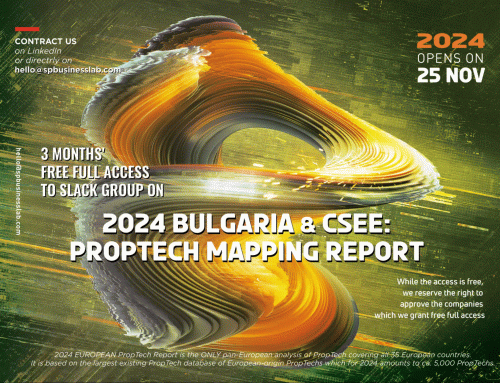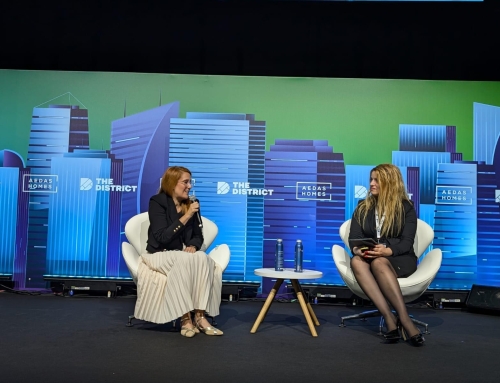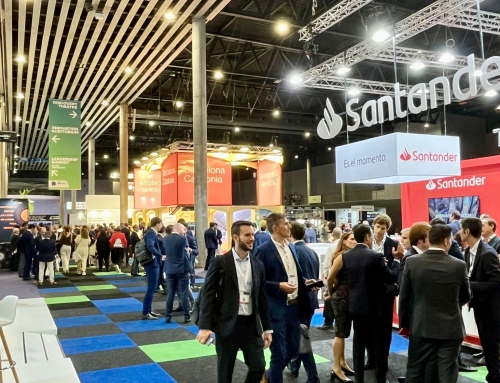FINTECH & PROPTECH: Trends on the overlap PART 3
Postbank: The use of digital channels has accelerated rapidly, and is set to continue, even once the COVID-19 situation has eased.
A set of several type of technologies was heavily used in the Covid environment not only in front office. In the middle and back office AI and Machine learning proved their efficiency.
As Philip Kotler stated „The future isn’t ahead of us. It has already happened.“
That is even more valid in the current environment, when we are facing booming development in the artificial intelligence, machine learning, Natural Language Processing, Sensor tech, Robotics, Augmented, Mix and Virtual Reality, IoT and Blockchain. Further development in these technologies have potential to change significantly vast amount of process even all business environment.
The interview is completed by Sylvia Pavlova MBA CMC, Founder PropTech Bulgaria, Co-Founder PrEXCELerator Bulgaria.
This interview was part of the Bulgarian PropTech Business Show on RE:Connect 3.0 on 24 June 2021. Bulgaria was represented by PropTech Bulgaria at RE:Connect 3.0 – one of the largest PropTech events worldwide. And this is the 1st part of our conversation. See the other 2 parts here >
About Nikolay Lazarov:
Nikolay Lazarov is Head of Sales Individual Banking Division
He has more than 15 years professional experience in finance sector at various positions in leading banks in Bulgaria. Responsible for development and business results of the variety of business lines and distribution channels. Fully involved in building of business ecosystem and B2B development. Responsible for primary customers base including growth and life cycle management.
Mr. Nikolay Lazarov has been part of the team of Postbank since 2015, responsible for managing all sales activities for Mass and Affluent segments, incl. Branch network, DSAs, Mortgage Brokers, Telemarketing, Online sales, specialized Mortgage & Consumer Lending Centers, Premium Banking Centers, POS and ATM, Payroll and Primary Clients, Western Union Business.
About Petar Ivanov:
Petar is a Certified Real Estate Appraiser with experience in all fields of RE industry: valuation, financing, transactions, consulting and servicing. His track record includes closing many real estate deals, valuation of large portfolios of assets and participation in financing of different projects.
In EOS Bulgaria he is responsible for the sale process of diverse RE portfolio countrywide.
About Radoslava Lukanova:
Radoslava Lukanova is Head of Specialized Centers Department, Individual Banking Division
Mrs. Radoslava Lukanova has been part of the team of Postbank since 2005, and over the years, she has held various positions in the Branch Network Department, Credit Department, Sales Department. Since 2015, she has been responsible for the strategic positioning, development and sales of Postbank’s Housing Lending Centers (30 throughout the country).
In her portfolio, she has implemented a number of innovative projects for the Bulgarian market – implementation of innovations in specialized centers for Consumer Lending “Momento”, development of a network with shared locations for sales with the leading telecom A1 and introduction and positioning of the first Online Mortgage Center of Postbank.
About Dobrin Mirevski EMBA:
Dobrin is the IT Systems Development Manager at EOS Matrix Bulgaria. He specializes in the field of business development for the last 24 years. Most of his professional expertise he acquired while working for 3 multinationals in diverse industries – active pharmaceutical ingredients, automobile microelectronics and financial services. He’s been managing for them sales and customer service activities to over 25 countries on 5 continents. Meantime he was also consulting and teaching for Sales and Commercial negotiations.
3. What do you admit will change in the upcoming year as a result of the pandemics, which processes will go even more digitized, and how?
NL: As Philip Kotler stated „The future isn’t ahead of us. It has already happened.“ That is even more valid in the current environment, when we are facing booming development in the artificial intelligence, machine learning, Natural Language Processing, Sensor tech, Robotics, Augmented, Mix and Virtual Reality, IoT and Blockchain. Further development in these technologies have potential to change significantly vast amount of process even all business environment. Nevertheless, businesses with the strong customer centric approach and developed ecosystem with strategic partnerships will be more competitive.
There are several trends. The first major one concerns payment, investment in payment methods. We see here a totally different landscape both in Europe, and Bulgaria. New tech players are coming. The banks need to react accordingly in order to keep their market share and protect the revenue. The payment is the battlefield. For a number of reasons. Firstly, when discussing payments, the trust level is the lowest, for example, compared to deposits. The trust among different market players which we have to have is low because there is a lot of regulation here. It is quite easy to convince the client to use one technology or the other as it is just a service and is not that much interrelated to the brand loyalty. Clients are very cost conscious. This intensifies the tension on this battlefield. The instant payment will be a normal service by the end of this year. I am pretty much sure about this. It is already normal in Western Europe, but it will become so in Bulgaria, too. Payment will be the field where we see heavy changes of the business environment as a result from technologies, regulations, and new market entrants.

The other trends which we see is the so called ‘Banking-as-a-Service’ based on the new regulation of PSG2. Banks open their systems for the so called APIs to third parties. That means that third parties can have an exposure to the client base of the bank. Definitely, this will change banking in the future for many reasons. The banks will create an ecosystem around themselves with different suppliers, in order to keep the client. Clients in both payments, and cards prefer to buy a service neither at a bank branch, nor online, but on the spot. For instance, I usually use some retailers and I want a card from a certain retailer. Here as banks we have 2 options. Firstly, to speed up our competition and marketing in order to compete with retailers. The other option is to work together with them and build the ecosystem. The second case is more common because it sets the client in the center of the business. We will encounter this trend all over Europe not in 2021, but in 5 years. Basically, we see such ecosystems in some of the largest European banks. We will give it a start in Bulgaria too, and will develop an ecosystem with partners. It is stated, ‘If you want to go faster, go alone. If you want to go a long distance, you need a partner.’ We need a partner in that area and again it will be very beneficial for the client because all these services will increase the customers’ engagement with the institution and improve the client journey. These will be the 2 forth-coming trends.
It is too early to talk about deposits because this process demands an extremely good trust between partners, as we have to see the payment history first, and after that the client will be able to access the different players and deposit his/her money.
The forth area typical for our industry is lending. We started in Bulgaria some peer-to-peer platforms, but at the end of the day, banks are the main supplier of lending, especially when we talk about mortgage lending. Here we have 99+ per cent.
For consumers there are some non-credit financial institutions with a significant market share. We also see a variety of only digital operators. However, banks again are the main supplier of this consumer fast loans credit cards despite that there are very good solutions provided by other players.
SP: While I was listening you, I remembered a panel that I watched yesterday about very large incumbent companies in Western Europe such as Siemens for example. You know that they innovate heavily in-house. At the same time, it was interesting to learn that they buy tech companies which already serve their customers. They acquire such technology companies, thus reinforcing their positions with their own customers. Just because Postbank is very intensively innovating in-house, I just wonder how you approach such tech solutions outside. Do you consider them competitors, or you are looking for some kind of a partnership?
NL: Partnership at the moment is the right way according to us, in the current moment, in the current environment, in the current market. There are many, many reasons. One of them is that it is very hard to operate as the bank is the legacy of the system and the whole procedure. And what can lead to a
partnership with a FinTech player or other financial industry player – because finance is everywhere: PropTech, FinTech, MedTech – is the tech company to be agile and to lead to creating an additional value for the bank. Partnership is the current way. We see that this is the common way in Western Europe. We see the other approach applied as well, but partnership is the wide spread one.
SP: You are aware of many tech solutions in the area which concern the operations of Postbank. Can you give us an example, if you have thought about this, for a bench mark tech solution which can be showcased as an example of a very good tech company in this overlap area of FinTech and PropTech, or only in FinTech?
NL: In payment we have very good examples, even local examples. Presently, we are approaching a number of companies which offer technology of payments, they transfer typical POS devices, and have developed an application that turns your mobile phone with a POS. You just can go and pay with your card. This is something innovative for our market. In payments there are some very smart and useful solutions which will definitely change the client perspective and the way how they bank every day. This is one thing. Next comes your sector – PropTech, and concerns the way we assess the value of a property. There a number of very good showcases in Bulgaria. For me it is very impressive to see the algorithms on property evaluation. We discussed not only one flat, but a portfolio of hundreds, thousands of such assets. It is more in the back office, but definitely show are that it will be a break-through in the future.
SP: Just to wrap up what’s your near-term vision of the future?
NL: Certainly, technologies are here to stay. More or less, they will change the way how clients approach their suppliers. Definitely, technologies will speed up the process. In the front office, as I mentioned, but also in the back office. Technologies will help us to be more effective in our cost structures. Furthermore, they will help us start developing new products and wave of services. Nevertheless, technologies will never kill the regular brick-and-mortar channel. This is the trustful channel. Some of the services will shift, but it is too early to say that any technology in 5 years’ time will completely change the way of doing business. Just 2 basic things to keep in mind. Firstly, the shift in the generation. Presently, the more powerful generation is Gen Z, those born from 1981 till 1996. This is the 1st digital generation, born with Sega, Nintendo, and so on. From this generation we see the first results. Next, the Millennials, or the so-called Gen Alpha, they are completely digital and living in a vertical world. What do I mean? The phones are vertical. Platforms such as Tik-Tok are vertical. We preview such a significant change but coming in next 10-15 years. So, on one side we see the change related to the generation, and on the other, we see the further improvement of technology. Now we have a 40-years’ history backwards, when we talk about the internet. Technology will further penetrate everywhere. Introducing 5G and the IoT, many, many things in the way we live will be changed. In addition to the generation shift and the technology improvement, the 3rd factor will be the clients’ availability to apply these technologies, which will result from us educating our customers. These factors shape up a significant future change in the next 10-15 years.

DM: The reality is that in all forward thinking organizations currently every single process is under “digitalization” scrutiny as a result of the pandemic. In a way we were forced by the situation to take this path, as going digital was one of the very few viable options to survive.
As I already mentioned, self-service based on digitalization is here to stay and already changes customer service, virtual and augmented reality will significantly change sales and marketing, hybrid work will become the standard and have its impact on PropTech.
Additionally, we will see traditionally more conservative areas like employee relations or finance/accounting also significantly digitized, for example through robotic process automation. AI will continue to change product customization and individualization.
I would even say that now our collective mind is better trained and prepared to accept digitalization, so I would expect to see in the next years a significant surge in digital innovation across all industries.











Leave A Comment